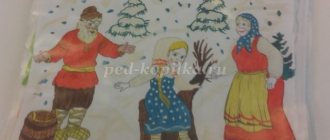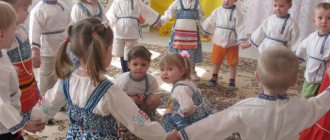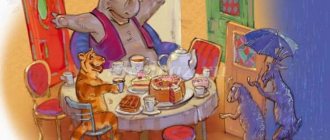Games to develop verbal communication
Anastasia Sergeevna
Games to develop verbal communication
Games to develop verbal communication.
1. Polite words
Goal: development of respect in communication , the habit of using polite words.
How to play : The game is played with a ball in a circle. Children throw a ball to each other, saying polite words. Say only the words of greeting (hello, good afternoon, hello, we are glad to see you, we are glad to meet you); thanks (thank you, thank you, please be kind)
;
apology (sorry, pardon, sorry, sorry)
;
farewells (goodbye, see you, good night)
.
2. Interview
Goal: development of communication skills, active vocabulary, ability to enter into dialogue. Number of players: 3 or more people.
Necessary equipment: chair.
Progress of the game : children choose a leader, and then, imagining that they are adults, take turns standing on a chair and answering the questions that the leader will ask them. The presenter asks the child to introduce himself by name and patronymic, talk about where and who he works for, whether he has children, what hobbies he has, etc.
Comment: at the first stages of the game , children often find it difficult to select questions. In this case, the adult takes on the role of leader, offering the children a sample dialogue. Questions can concern anything, but you must remember that the conversation must be “adult”
.
This game helps to get to know children who have just joined the group, as well as to involve shy children in communication . If the children are still very new to each other, the rule can be changed a little: the child who caught the ball says the name of the previous player, then his own, and then (if he knows)
the name of the child to whom he will throw the ball.
3. Old grandmother
Goal: development of communication skills, trust, empathy, development of motor dexterity . Number of players: 8-10 people.
Necessary equipment: blindfolds.
Progress of the game : children are divided into two teams - grandmothers (grandfathers)
and grandchildren
(granddaughters)
.
The “old people”
are blindfolded - they are very old, so they don’t see or hear anything and they must definitely be taken to a doctor.
You will have to walk across a street with heavy traffic. Their grandchildren (granddaughters)
, trying not to get hit by a car.
Then they draw a street with chalk, and several children become “cars”
, running back
and forth
the “street” The grandchildren’s task is not only to take the “old people”
across the road, but also to show the doctor (one of the children plays his role), and buy medicine at the pharmacy, and then bring it home.
Comment: before starting the game , you can talk with the children about the need to help the elderly and grandparents. You need to practice taking a characteristic pose. During the game , the adult regulates the relationships between the players. "Grandmothers (grandfathers)
"must trust their grandchildren,
"machines"
must follow the rules.
4. Glomerulus
Goal: development of communication skills. Number of players: group of children. Necessary equipment: ball of thread.
Progress of the game : children sit in a semicircle. The adult stands in the center and, winding a thread around his finger, throws a ball to the child, while asking about something (what is your name, what do you love, what are you afraid of)
. The child catches the ball, winds the thread around his finger, answers the question and asks a question, passing the ball to the next player. If the child finds it difficult to answer, he returns the ball to the leader.
5. Understand me
Goal: to develop the ability to navigate people’s role positions and communicative situations.
Progress of the game : The child comes forward and comes up with a speech of 4-5 sentences. Children must guess who is speaking (tour guide, journalist, teacher, literary character)
and in what situation such words are possible.
For example, And so everyone went to the start. 5,4,3,2! – start! (The situation is a competition between athletes, says a sports commentator)
.
Games for children on verbal intelligence
I recently heard this phrase – verbal intelligence. It turns out that it begins to form in early childhood, and in the future it affects a person’s position in society and his career growth. In general, this is a very important and necessary thing. Therefore, I was concerned with the question “How to develop verbal intelligence in my son?” And, interestingly, I found several games for children that help develop this necessary thing. I suggest you get to know them too.
Pick a pair
You can start with a simple game. Invite your child to continue the sentence and choose the correct pair:
Cow-calf
Leg - hand
Chicken - …
Time ago
For this game you need to choose a theme. For example, “Shop” or “Forest”. Each participant (it will be easier if an adult starts the game) says a short story. But the main thing is that he says “backwards.” That is, first how the story ended, and at the very end about how it all began.
You can practice on famous fairy tales, and only then move on to your own stories (tested, it’s easier this way).
Domino
For this game we use cards from children's dominoes. But these can be pictures from magazines and drawings.
So, the presenter gives each player a card (and places it face down so that none of the participants can see which picture the other player has). The first player places his card face up in the middle of the table and begins the story. It could be a fantastic story, a horror story, or just a story about what is shown in the picture.
The story does not need to end; at a certain moment (you can agree on a conditional signal that the presenter will give) the turn passes to the next participant. He also places his card in the middle of the table, face up, and continues the story. That is, his story should be, on the one hand, a continuation of the story of the first player, and on the other, his own story with individual details.
The last player must continue the story of the previous one, introduce his “card” hero and finish the story.
Create a proverb
For this game you will need preparatory material. In advance, I wrote down on a piece of paper the proverbs we know (and Styopka knows a lot of them, our grandmother is simply a treasure trove of proverbs).
I wrote out proverbs in this way: in the left column is the beginning, in the right column is the end of the proverb.
I wrote it in large block letters (so my son could read it faster). I number each proverb. I put an hourglass on the table and Styopka begins to connect the beginning with the end. It looks something like this:
A coward and a cockroach 1 - where the wolf walked among the shepherds in the forest 2 - hurry up to listen to what Dema is like 3 - takes him for a giant Don’t rush to answer 4 - but he didn’t see any wood It’s bad for the sheep 5 - that’s how it is at his home
We compose the answers as follows:
1-3
2-4
3-5
4-2
5-1
If you didn’t have time to find a pair, and the sand in the watch had already poured out, you lost.
To each his place
A game for children, built similar to the previous one. Only here I write proverbs and change words. You need to make up the correct phrase from the words. For example:
Mute, tongue, without, bell, etc. (And the bell is silent without a tongue)
Idleness, small, deed, big, better (Small deed is better than big idleness)
Speak boldly, a good deed, speak about (Speak boldly about a good deed)
And, a ball, a thread, along, reach, to (Along the thread and they reach a ball)
It happens!
In the game for children “It Happens!” all participants take turns telling something incredible (about things, a natural phenomenon, an unusual animal...). The winner is the one who tells four exciting and interesting stories and no one ever says to him: “This happens!”
Come up with your own
Again, you can practice on famous fairy tales. The presenter reminds the plot, and the players’ task is to come up with original names. For example, “Kolobok” - “Grandson made of dough”, “Outwitted the fox”, “Escaped from relatives”...
And then you can move on to unfamiliar stories. Read and come up with names. I also like this game because it teaches you to think creatively. I myself enjoy playing it.
Same signs
We haven’t fully mastered this game for children yet, so I admit, it’s still a bit tricky. But we do not despair, but continue to train.
So, the presenter sets the task - to come up with objects with similar characteristics. For example, round and flat. It could be a pancake, a circle drawn on the asphalt, a crushed tire...
As the game progresses, the tasks become more difficult. There may be more signs, but examples are no longer easy to find. The hardest thing is to find objects that perform opposite functions. For example, a window (opens and closes), a hand (strokes and hits).
The one who comes up with the most answers wins.





